Grab-BYD partnership signals Southeast Asia’s EV future
Grab partners with BYD to bring 50,000 EVs to Southeast Asia, aiming to lead the region's green transport shift despite infrastructure challenges.

Grab has revealed plans to expand its electric vehicle (EV) fleet, committing to introducing up to 50,000 BYD vehicles across Southeast Asia. This significant move signals the company’s ambition to drive the region’s transition to greener transportation.
Table Of Content
“Through this partnership, Grab and BYD aim to accelerate the electrification of Southeast Asia’s transportation sector,” the Singapore-based ride-hailing giant said on Wednesday, January 15.
Boosting EV adoption despite regional challenges
While the initiative marks a major step toward sustainable transport, challenges remain. According to a transport analyst, countries like Indonesia, Thailand, and Vietnam lag behind Singapore and Malaysia in EV infrastructure development.
Analysts have also raised concerns about Singapore’s readiness to accommodate a surge in EV adoption, particularly regarding its charging infrastructure. However, Grab reassures that the partnership with BYD will offer drivers access to EVs at competitive rates and with extended battery warranties, reducing the financial barriers that often deter EV ownership.
Grab, which operates in eight countries – Cambodia, Indonesia, Malaysia, Myanmar, the Philippines, Singapore, Thailand, and Vietnam – has not disclosed how the 50,000 EVs will be distributed across these markets.
Transport analyst Associate Professor Raymond Ong from the National University of Singapore noted that larger markets like Malaysia and Indonesia will likely receive a bigger fleet allocation than Singapore. “Given the sheer market size, I don’t think Singapore will account for most vehicles. Malaysia and Indonesia’s markets are much larger,” he explained.
Chuck Kim, Grab’s managing director of group business development, highlighted the partnership’s potential to make EVs more accessible by reducing financial barriers, such as high upfront costs while helping drivers achieve long-term fuel savings.
Addressing EV infrastructure gaps
The transition to EVs faces obstacles, particularly in countries with limited charging infrastructure. Outside of Singapore and Malaysia, where EV adoption is more advanced, many Southeast Asian cities are still in the early stages of building charging networks.
“For Singapore, infrastructure is less of a concern as the development of charging points is progressing well. Malaysia is also investing significantly in its EV infrastructure,” said Assoc Prof Ong. However, he noted that cities like Jakarta are only beginning to develop their EV capabilities.
Grab acknowledged these challenges, stating that Southeast Asia is still at the start of its EV journey. A spokesperson said, “While progress has been encouraging, the region needs more affordable EV models, extensive charging infrastructure, and additional battery-swapping stations to support EV growth.”
Grab plans to collaborate with key players in the EV ecosystem and leverage its data, technology, and driver network to test and implement solutions to address these gaps.
Eco-friendly options for passengers
Passengers in Singapore and Thailand can now select “eco-friendly rides” via the Grab app, prioritising green vehicles without extra charges.
However, Assoc Prof Walter Theseira from the Singapore University of Social Sciences said passengers are unlikely to pay a premium for EV rides unless luxury vehicles are involved.

To support EV drivers, Grab has partnered with six major EV charging companies in Singapore, including SP Mobility and Shell, offering discounts to lower operational costs.
The partnership also incorporates Internet of Things (IoT) integration, with BYD vehicles connecting directly to Grab’s platform. Features like displaying the Grab driver app on the car’s head unit make navigation and communication easier. At the same time, real-time data, such as wiper activity and speed, helps the platform monitor traffic and weather conditions.
This integration ensures better ride allocation during peak demand, improving the passenger experience while supporting greener travel.
















